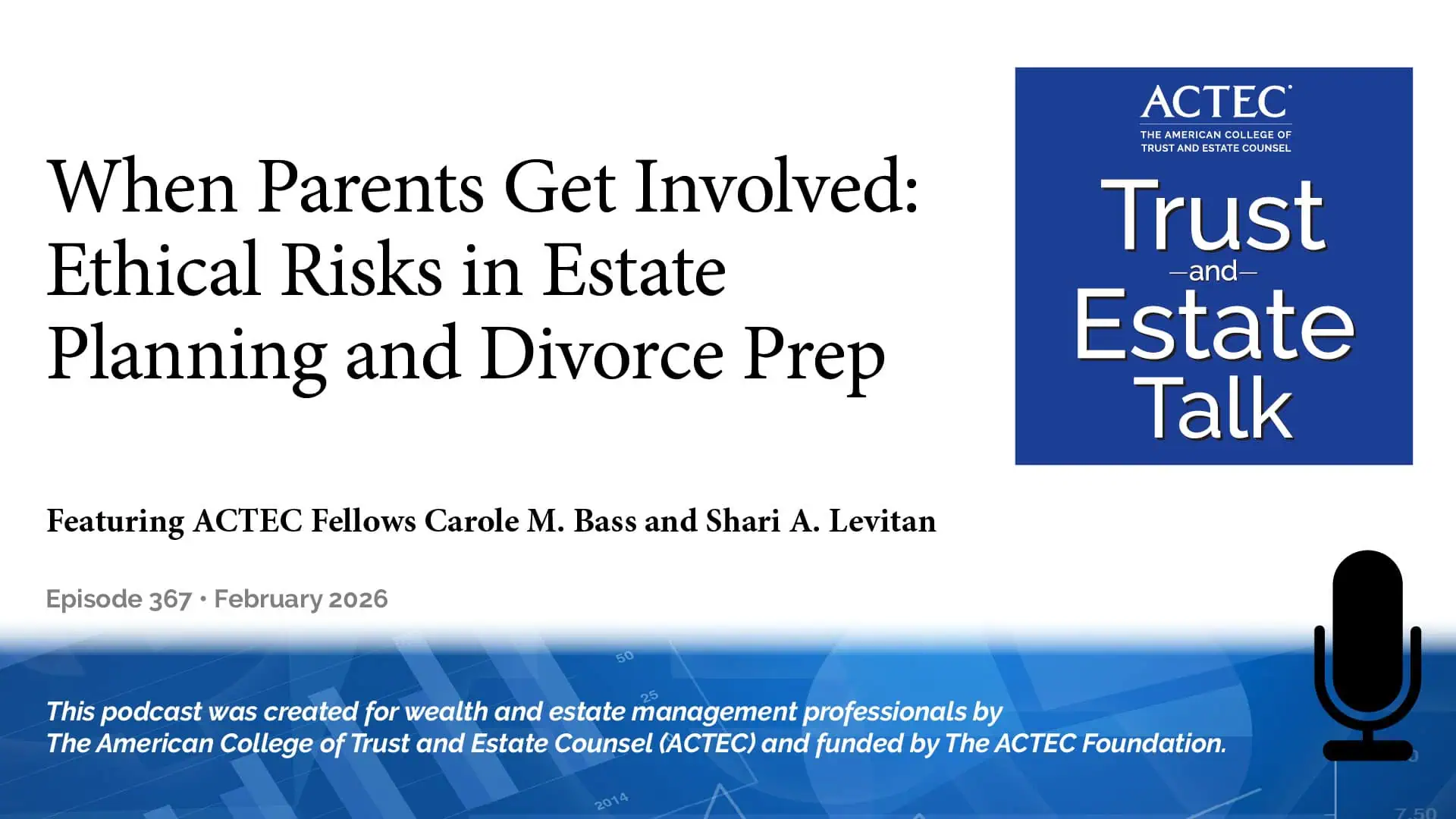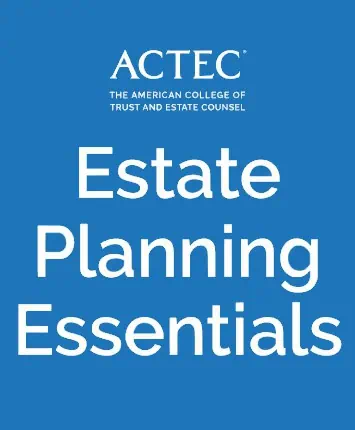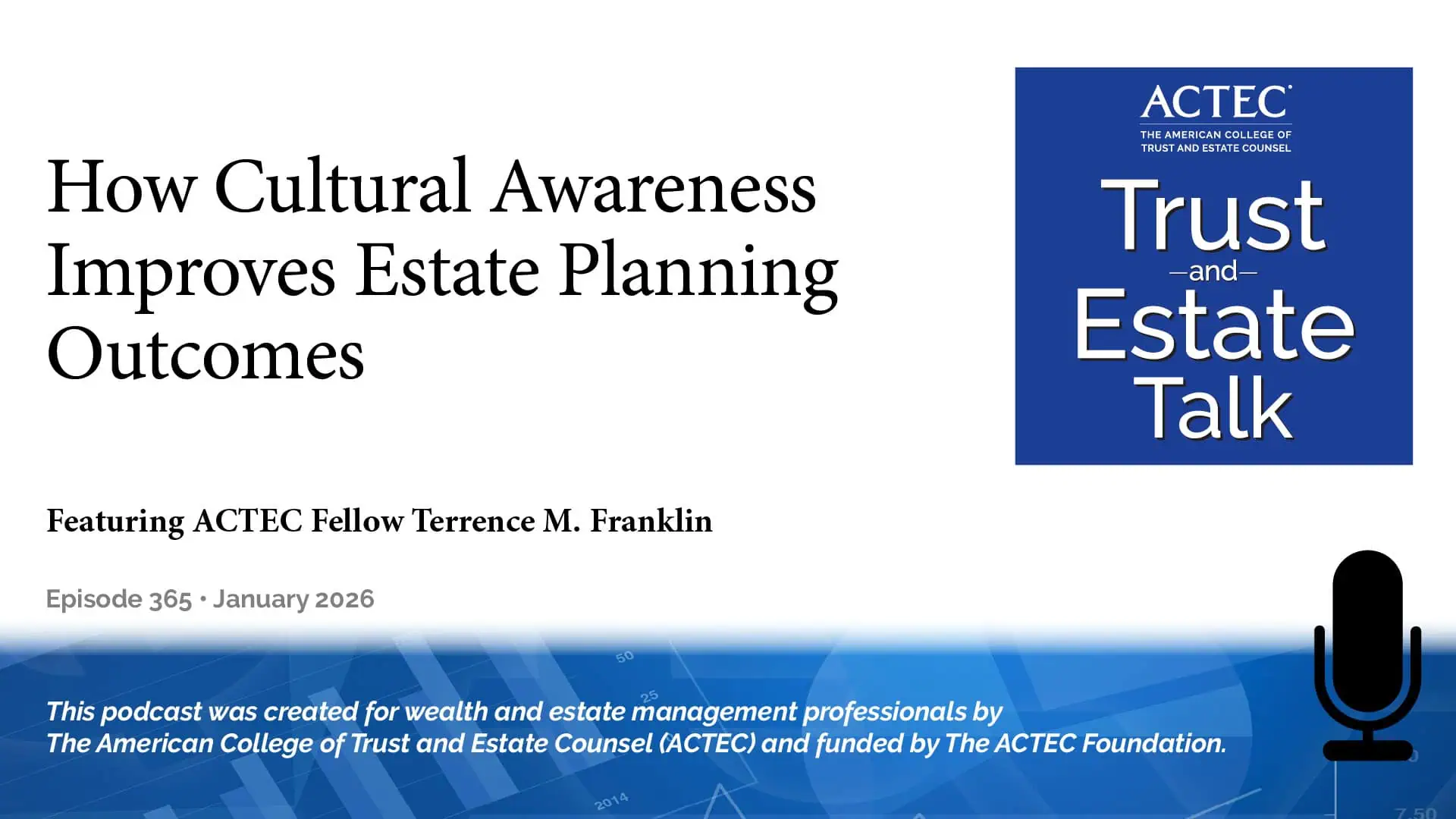The Ethics of Posting to Listservs
“The Ethics of Posting to Listservs,” that’s the subject of today’s ACTEC Trust and Estate Talk.
Transcript/Show Notes
This is Travis Hayes, ACTEC Fellow from Naples, Florida. On May 8, 2024, the American Bar Association’s Standing Committee on Ethics and Professional Responsibility released a formal opinion that provides guidance on when a lawyer can seek advice on a listserv, noting that the model rules in most cases forbid posting questions or comments relating to a client representation, even in hypothetical or abstract form. Lawyers, on occasion, post questions or comments relating to a representation on a listserv without the client’s informed consent in order to obtain perspectives from colleagues.
ACTEC Fellows Meg Lodise from Los Angeles, California, and Bill Hennessey from West Palm Beach, Florida, join us today to discuss this issue. Welcome, Meg and Bill.
Bill Hennessey: Thank you, Travis.
Hey, Meg, I have a question for you. Remember that case that you were working on last year? I saw the opinion came down last month. We’ve got an upcoming committee meeting for Fiduciary Litigation in ACTEC in Chicago. We were wondering if you’d come talk to our committee and give us a little bit of the rundown, some of the background on that opinion. It’s really fascinating.
Meg Lodise: Hey, Bill, thanks for asking me. I’m not entirely sure whether I can do that after I reviewed this Formal Opinion 511. I know we talked a little bit about it in the Professional Responsibility Committee at the last meeting, but Opinion 511 is titled, “Confidentiality Obligations of Lawyers Posting to Listservs.” It says that Rule 1.6 [Confidentiality of Information] prohibits a lawyer from posting questions or comments relating to a representation to a listserv, even in a hypothetical or abstract form, without the client’s informed consent. If there’s a reasonable likelihood that, based on the information that’s disclosed, somebody could later infer the identity a lawyer’s client and the situation involved, then the information should not be shared.
The thing about it is I don’t think it’s just limited to listservs. And what you’re asking me to do is to present to a large group of people. One of the things that the opinion talks about as to why listservs are problematic is because you don’t know who’s getting the information. It’s going to a broad group of people, and you can’t ask them to limit the confidentiality. So, if I tell you a war story about my client at this committee meeting—and you know for Fid Lit [Fiduciary Litigation], there are 100 people there—I’m not going to get confidentiality waivers or confidentiality agreements from all of them. And so I think there’s a real issue.
The opinion is pretty clear in saying that Rule 1.6 doesn’t simply limit the disclosure of confidential information. It limits disclosure of anything that you’ve learned related to the client. I actually think that, with the opinion, I am maybe in a situation where I’m going to be less able to talk about it than, for instance, you would have. I mean, you’ve read the opinion. You don’t have any client information. You could talk about it. It seems to me that that might be more allowed under the opinion.
Bill Hennessey: Which is strange, right? I mean, I could get up and talk about the opinion, talk about what the facts were. But it seems like the opinion says you need to be careful as the lawyer who worked on the matter. Right?
Meg Lodise: Yes, that’s exactly what the opinion says. It specifically refers to Rule 1.6. It says, and it distinguishes 1.6 from a disciplinary rule, which limits disclosure only to confidential information or nonpublic information. But in footnote 12 of the opinion, it specifically says, “Rule 1.6 does not permit disclosure of nonprivileged information relating to a representation or former representation if its disclosure would not embarrass or harm a client and the client has not specifically asked the lawyer not to disclose it.”
So, it’s not only you just can’t say anything that you’ve learned from your client, even if it is now publicly available. I mean, for instance, if I want to talk about a transcript or I want to talk about what happened in the trial of the matter, I think this says you can’t disclose it. And that footnote goes on to say, consequently, lawyers may not tell war stories about a former representation without the former client’s consent if the former client or situation can be identified. And clearly, with a published opinion, the client can be identified. Right?
Bill Hennessey: Oh, absolutely, right. You know, that was the striking part about this opinion to me, because I think that’s one of the things that lawyers really like to do is regale each other with these stories. And it really is beneficial for us all to hear that so we understand what happened in the case and we can figure out the opinion and get a good flavor for the arguments that were made that led to it. So, it seems to have a stifling effect on our ability a little bit to share information, which the opinion lauds, by the way. It talks about the benefits of doing listservs and having the opportunities to do that. But by the same token, it’s basically saying you have to be careful.
Meg Lodise: Yes. Well, although one of the things in the opinion, I think, is footnote 15, which talks about how you get consent, because obviously you can do this if you get consent. I know when I sort of took an informal survey from some people who use listservs, there’s one at least who said that they talk with their clients specifically at the commencement of the representation about the possibility of talking about things on listservs. And footnote 15 talks specifically about what it might require to get the necessary informed consent.
So, the lawyer would have to explain the risk that the client’s identity could be revealed and that the people who get the information wouldn’t be obligated to hold it confidential. And there’s also the possibility, particularly on a listserv—but I think this is true when you’re making a presentation to a broad enough group of people—,that somebody who’s adverse to the client may hear the information and get it.
Now, it might be that it’s easier to get a client’s consent when the case is all over and there’s no further risk to the client. Maybe say, “Hey, by the way, when this is all done, are you OK with me explaining what happened?”
Bill Hennessey: Yeah, that seems so clunky. So, let’s try to figure out by parsing the opinion for a second as to what it says we can do. It basically says that without the informed consent, a lawyer participating in a listserv, or we’ll call it even a group discussion, should not disclose any information relating to a representation that may be reasonably connected to an identifiable client. That, I think, is the test, right? If it can be connected to a client, then you shouldn’t be disclosing it on a listserv, in a group discussion, et cetera.
On page 5 of that opinion, it gives us some examples of situations where you’re probably pretty safe: posting some things on a listserv where you’re not disclosing any relevant client information, but you’re asking broad questions or abstract questions where the client’s identity is never going to be known. That would be appropriate, right?
Meg Lodise: Right. For instance, a popular topic of conversation in California is what the assessor’s office is going to do on a property tax reassessment. So, if you have some question about a reassessment, or I’ve got an issue where the transfer was 15 years ago, you might confuse the number instead of saying from a parent to a child, say a parent to three children. Do something to sort of confuse it or make it very general in terms of what is the assessor’s office doing in a situation where they’ve got a 15-year-old transfer from a parent to a child. Given the nature of our practice, that’s unlikely to identify any specific client in my office.
The opinion is interesting because it talks a little bit about, (if your practice is like my practice—and we’re entirely property tax assessment—and I asked the question about property tax assessment) the idea that somebody is going to be able to figure out which of my 100 clients I‘m talking about it gets pretty attenuated. On the other hand, the opinion also talks about the fact that if you’re talking among a group of people who all do sort of the same thing and practice in the same area—and I would argue that’s a lot of our ACTEC groups—it makes it easier to identify who the client is because I might know, just from my general knowledge of you and your firm, who you represent. So, it might be easier to figure that out and to narrow down the client.
Bill Hennessey: One of the things that it says is [sharing] a description of specific facts and hypotheticals that are easily attributable to a client could violate the rule. So, if I were to say, ”Hey folks, I’ve got this case pending right now in Palm Beach, and here’s the situation: I’ve done some research on this. Has anybody looked at this particular issue in the case?” And I post it to a listserv. My opposing counsel could see that and say, “I know exactly the case he’s talking about.” I think that’s the danger that it seems like this opinion is trying to hit. If you start posting too much information to the listserv, even if you don’t give the name of the client, then it might ultimately cause you to violate that rule unintentionally, right?
Meg Lodise: Right. And obviously, the more information you post, the more information you get back, and the more helpful information you get back. It’s just like making a search inquiry, right? You want your search to be narrow enough to where you get relevant information back. So, you have to be careful.
One thing is that you could mix up genders, numbers of people, or generations. You could do things to try and really alter the terms of the hypothetical. The opinion also says that, of course, the more specialized the situation, the more likely that you’ve got a problem. And again, the time you’re going to a listserv may be when you have a very unique problem. So, you want to get sort of the hive mind, as it were, working on your unique problem.
But this opinion suggests that you probably shouldn’t be doing that. And as they say, I think it applies beyond listservs. I think it’s an issue in, for instance, a committee meeting. So, if you’ve got enough people involved in the committee meeting and you are specific enough about what you’re talking about in a committee or any other kind of a meeting that you’re involved in (you’ll have a problem).
Bill Hennessey: So, a quick aside: Our ACTEC Commentaries also contain a discussion on this, Meg. The ACTEC Commentaries, by the way, for folks who don’t know, are put out by the American College of Trust and Estate Counsel. And they comment on all of the Model Rules that are applicable to us as trust and estate lawyers.
It runs through basically all of the 1.1 through 1.16 Rules and provides commentary from an estate planning perspective. Free on our website, by the way, or free on the [ACTEC] Foundation’s website. If you look in ACTEC Commentaries, you can pull them up. It’s a great resource for folks who are researching ethical issues.
And it essentially tracks the opinion. I mean, it basically says a lawyer has no implied authority to disclose client confidences on electronic bulletin boards, CLEs, and similar public forums outside of which the firm’s own law firm may be participating. And if the information could reasonably lead to the discovery of client information, it’s precluded. It says you can use hypotheticals to discuss issues only so long as there’s no reasonable likelihood that others in the public forum will be able to ascertain the identity of the client or the situation involved.
Which, again, brings us back to the to the most frightening part about this for me, which is that broad statement in there about the fact that public information like transcripts, and I guess even reported opinions, may provide at least some argument that you have to be careful about violating the rule. So, I just think we need to be careful out there as we share information and regale each other with war stories. Again, all these things, all these opinions and things we’re talking about—and all the benefits of doing that—but yet, it’s telling us to be careful, right? Be careful about what you share. I think that’s the message.
Meg Lodise: Yes, be careful. And it does point out the sort of the old-fashioned way, which is I pick up the phone and call you, Bill, and sort of employ you, as it were, as a consultant. I can talk to you about that. And so obviously, you can still do that because then, there’s a limitation. Then, I know that you’re the one I’m disclosing it to. I can request that you keep this in confidence. We can create a relationship that continues to protect the confidences of the client. And I say confidences because, again, this is not limited to attorney-client or confidential information. It’s any information related to the client. I think that’s what makes this opinion so broad and a little bit scary.
Bill Hennessey: For sure. All right. Well, thank you, Meg. I appreciate you getting together.
Meg Lodise: Thanks, Bill.
Travis Hayes: Thank you, Meg and Bill, for discussing with us the ethics of posting to listservs and the ABA’s recent formal opinion on the subject.
- ABA Formal Opinion 511R (May 8)
- ABA issues guidance on lawyers’ use of email groups (May 13, 2024)
- ABA issues ethics guidance on a lawyer’s use of email groups, particularly for pending matters (May 28, 2024)
- ACTEC Commentaries on the Model Rules of Professional Conduct
Latest ACTEC Trust and Estate Talk Podcasts

Estate Planning Considerations in Community Property States Relating to Retirement Accounts
Explore how community property laws shape IRAs, 401(k)s, beneficiary designations, and spousal rights in retirement account estate planning.

When Parents Get Involved: Ethical Risks in Estate Planning and Divorce Prep
When parents join prenup or divorce planning, ethical risks follow. ACTEC Fellows explore privilege, conflicts, and protecting the attorney-client relationship.

Useful But Overlooked Trusts: A Planner’s Guide to When and How to Use Them
Explore overlooked trusts—including HEETs, alimony, voting, and blind trusts—and when estate planners should use them to address complex client needs.



